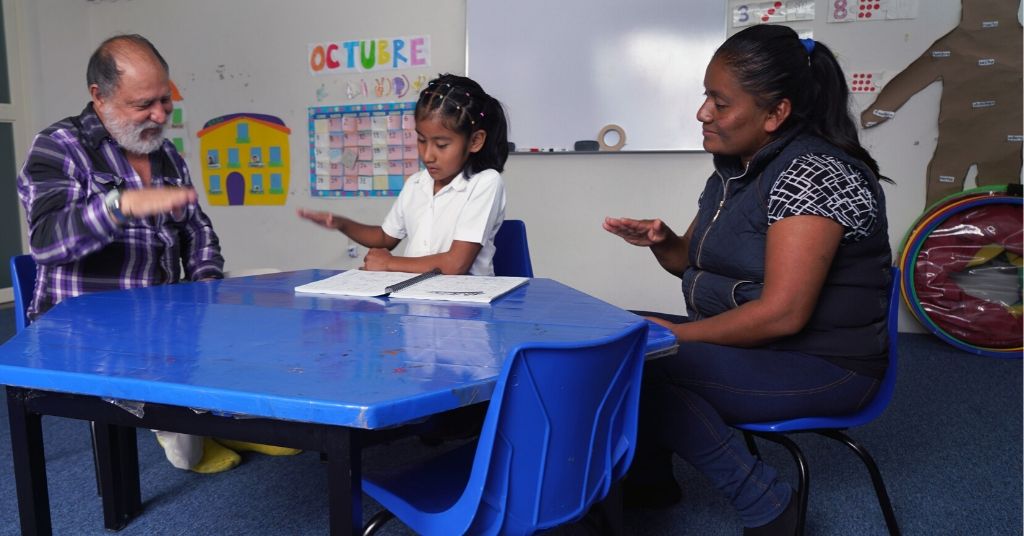
Everything you need to know about getting a hearing test
September 14, 2017
Deaf model’s cochlear implant photoshopped from ad
September 18, 2017Why the Here To Hear Tour is so important to deaf teens

I love to learn. I graduated college in May 2016, and I will cherish the knowledge I gained from my university experience forever. But, the thought of being back in a college classroom makes me feel uncomfortable. Not for academic or workload reasons, but for factors that have to do with my hearing loss.
Going to college is a huge transition. It is an even bigger transition for someone with hearing loss.
For me, college meant no more IEPs, no familiar teachers who checked up on me, and less involvement from my parents in my education. It also meant having to tell my professors about my hearing loss myself, and about the additional accommodations I needed. It even meant figuring out what those accommodations were.
Attending college with hearing loss
On top of that, university students have an overwhelming amount of new information entering into their brain every day.
Aside from focusing on our education, there are also social factors that can add to the stress. Things like learning a new city and campus, making new friends, finding extra curricular activities, figuring out your major and how all of this will lead to making the most out of the expensive education you are about to receive during the next four years.
Then, of course, there are small things. Things like learning how to submit a maintenance request for your broken AC in your dorm, setting up a bank account and other tasks that feel big when added up. As a student new to university, it feels like you have to figure it all out in the first week… well if you’re like me.
Using hearing technology in the classroom

During the tour, students will be informed how to get technology like the Roger Pen for free
When I first started classes I received assistive technology from my university disability councilor. These devices are free for students with diagnosed hearing loss, in accordance to Section 504 of Rehabilitation Act of 1973 & Americans with Disabilities Act of 1990.
FM systems
On my first day of class, I received an FM system and went to class, eager to learn and start this new chapter in my life.
Unfortunately, I ended up not liking my FM system.
I found it hard to hear when other students participated in class. Often, my professor seemed too loud through the device. Soon, I ditched my FM system. I told my professor that if I stayed near the front I would be able to hear him. (Which was true… to a certain extent.) But as classes got harder and lectures contained new words and concepts, classes quickly became more difficult.
Note taking and lipreading
Taking notes is where I struggled the most.
My freshman year I stuck to the traditional pen and paper. I quickly realized that was something I could do in high school, but not in college. I couldn’t read the professor’s lips, write and manage to catch all the information simultaneously. Instead, I brought my laptop with me everywhere. This was better because I was able to type without looking at my keyboard, but when I got stuck on a word I didn’t hear, or my professor turned their back, it felt like I was doomed.
“…when I got stuck on a word I didn’t hear, or my professor turned their back, it felt like I was doomed.”
Anxiety would hit me on unexpected days. Days when my professor had a cold and couldn’t speak clearly, or when we had a guest lecturer with a high-pitched voice. Other times, we would spontaneously decide to have class outside, which was enjoyable for my classmates but caused me stress as I struggled to hear my professor with wind blowing across my hearing aids.
Sometimes the worst thing about studying with hearing loss was that my other classmates who surfed social media during lectures still had better notes than me. (I know I miss some information, but really?!)
What was exciting or a change of pace for my other classmates produced anxiety and stress for me.
Self-advocacy in education
Why didn’t I just ask for a note taker? Or tell my professors about my hearing loss struggle?
I could rattle off excuses about why I didn’t do this, but in reality it was because I was unable to think logically. Stigmas I wasn’t aware of affected me. Sometimes, it was also a matter of pride.
I had a disability counselor my freshman year, but she resigned and was replaced with a person I never actually met. At the time, I never bothered to find resources because I didn’t exactly know what help I could receive. What I did know, was that I didn’t want CART or a FM system, so I didn’t look any further.
“I never bothered to find resources because I didn’t exactly know what help I could receive. What I did know, was that I didn’t want CART or a FM system, so I didn’t look any further.”
I knew how to advocate for myself, but college was a more difficult environment. This is why the Here to Hear Comedy Tour, featuring deaf comedian D.J. Demers is so important.
Read more: Deaf comedian’s epic road trip to break down hearing loss stigmas
Why the Here To Hear Tour is so important
Throughout the entire month of October, which is also Disability Awareness Month, comedian D.J. Demers will be traveling to universities across the U.S. to help break down stigmas around hearing loss and help inform students like me about the free technology available to them.
The Here to Hear Tour aims to share knowledge with hard-of-hearing students. College students out there who were like me – with mild hearing loss and shy – as well as students who have more severe hearing losses and are starred at every day when they have their CART out or their interpreter with them.
“The Here to Hear Tour aims to share knowledge with hard-of-hearing students. College students out there who were like me – with mild hearing loss and shy – as well as students who have more severe hearing losses and are starred at every day when they have their CART out or their interpreter with them.”
D.J. will aim to break down stigmas around hearing loss that burdened me into thinking that I just needed to work harder. Stigmas that made me feel like hearing loss was my fault. Something I had to deal with on my own, not knowing how to receive the extra help and support I needed.
I believe this tour will provide the extra awareness that has never been publicly discussed.
Seeing D.J., a comedian with severe-to-profound hearing loss who isn’t afraid to joke about his hearing loss is refreshing and exciting to see. The fact that he will be surrounded by an online community of deaf individuals, such as the Phonak hEARos, who inspired the tour, is even more amazing. This community personally empowers me daily. I hope it will empower others along the way, especially university students who will have an opportunity to change their education and possibly their lives.
“This community empowers me daily. I hope it will empower others along the way, especially university students who will have an opportunity to change their education and possibly their lives.”
I like to dream big, but I believe even the smallest impacts of this tour will make a huge difference. I’m confident it will be a victory in the overall conversation about living with hearing loss.

Behind the scenes: The Here to Hear Tour will be filmed daily for YouTube.
This tour is going to change lives. It will inspire a student who is having trouble hearing to get their hearing tested, and encourage a deaf or hard of hearing student explore new technology options with the help of their university disability department. It will allow a hearing student who notices hearing aids on a classmate to open up a conversation, understand communication methods and make a new friend.
These are the steps to spreading awareness, ending the stigmas and bridging the gaps. This is what we, as people with hearing loss, need.
“These are the steps to spreading awareness, ending the stigmas and bridging the gaps. This is what we, as people with hearing loss, need.”
I never imagined a hearing aid company would be the one to sponsor an advocacy and awareness campaign like this, but with Phonak as a sponsor I am happy that the wheels are turning the right way. Finally, the hearing aids I wear will be seen around the country and by people close to my age. A wave of ignorance will be lifted.
The Here to Hear Tour kicks off in October, beginning at Washington State University and ending at Yale. For 30 days, D.J. will travel by bus to 20 universities from California to New York. The best part: even those of us who can’t attend a show will be able to follow along, as the entire tour will be documented with daily vlogs on YouTube.
Join D.J. and our community as we support his journey, our journey and our future for better hearing.
Here to Hear Tour dates:
RSVP online
October 3: Washington State University, Pullman, WA
October 4: San Francisco State University, San Francisco, CA
October 7: NACA South, Chattanooga, TN
October 9: Xavier University, Cincinnati, OH
October 10: Indiana University Bloomington, Bloomington, IN
October 11: University of the Ozarks, Clarksville, AR
October 12: NACA Central, Oklahoma City, OK
October 17: Miami University, Oxford, OH
October 18: University of Wisconsin Madison, Madison, WI
October 19: Augsburg University, Minneapolis, MN
October 20: St. Olaf College, Northfield, MN
October 22: Wright State University, Dayton, OH
October 24: University of Akron, Akron, OH
October 25: University of Akron – Wayne College, Orrville, OH
October 26: Iona College, New Rochelle, NY
October 27: Gallaudet University, Washington, D.C.
October 28: Rochester Institute of Technology/NTID, Rochester, NY
October 30: State University of New York at Cortland, Cortland, NY
November 1: Queens College, Flushing, NY
November 2: Yale University, New Haven, CT



